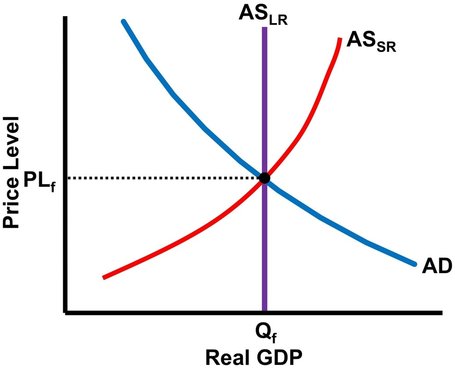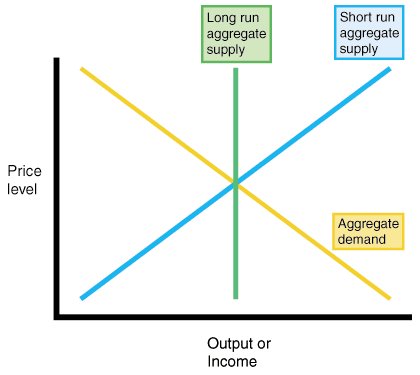The aggregate demand/aggregate supply, or AD/AS, model is one of the fundamental tools in economics because it provides an overall framework for bringing economic factors together in one diagram.
Shifts in Aggregate Supply and Demand – Principles of Economics: Scarcity and Social Provisioning (2nd Ed.)
This module introduces the macroeconomic model of aggregate demand and aggregate supply, how the two interact to reach a macroeconomic equilibrium, and how shifts in aggregate demand or aggregate supply will affect that equilibrium.

Source Image: youtube.com
Download Image
Jul 17, 2023The aggregate supply–aggregate demand model uses the theory of supply and demand in order to find a macroeconomic equilibrium. The shape of the aggregate supply curve helps to determine the extent to which increases in aggregate demand lead to increases in real output or increases in prices. An increase in any of the components of aggregate

Source Image: econmann.weebly.com
Download Image
Aggregate supply – Economics Help | Aggregate demand, Economics, Aggregate The next three chapters take up this task. This chapter introduces the macroeconomic model of aggregate supply and aggregate demand, how the two interact to reach a macroeconomic equilibrium, and how shifts in aggregate demand or aggregate supply will affect that equilibrium. This chapter also relates the model of aggregate supply and aggregate

Source Image: openoregon.pressbooks.pub
Download Image
In The Extended Aggregate Demand Aggregate Supply Model
The next three chapters take up this task. This chapter introduces the macroeconomic model of aggregate supply and aggregate demand, how the two interact to reach a macroeconomic equilibrium, and how shifts in aggregate demand or aggregate supply will affect that equilibrium. This chapter also relates the model of aggregate supply and aggregate The ADAS or aggregate demand-aggregate supply model (also known as the aggregate supply–aggregate demand or AS-AD model) is a widely used macroeconomic model that explains short-run and long-run economic changes through the relationship of aggregate demand (AD) and aggregate supply (AS) in a diagram.
Building a Model of Aggregate Demand and Aggregate Supply – Principles of Economics: Scarcity and Social Provisioning (2nd Ed.)
The aggregate demand/aggregate supply model is a model that shows what determines total supply or total demand for the economy and how total demand and total supply interact at the macroeconomic level. Aggregate supply is the total quantity of output firms will produce and sell—in other words, the real GDP. Aggregate Supply: Aggregate Supply and Aggregate Demand | SparkNotes

Source Image: sparknotes.com
Download Image
Aggregate Demand & Aggregate Supply Model | Features & Examples – Video & Lesson Transcript | Study.com The aggregate demand/aggregate supply model is a model that shows what determines total supply or total demand for the economy and how total demand and total supply interact at the macroeconomic level. Aggregate supply is the total quantity of output firms will produce and sell—in other words, the real GDP.

Source Image: study.com
Download Image
Shifts in Aggregate Supply and Demand – Principles of Economics: Scarcity and Social Provisioning (2nd Ed.) The aggregate demand/aggregate supply, or AD/AS, model is one of the fundamental tools in economics because it provides an overall framework for bringing economic factors together in one diagram.

Source Image: openoregon.pressbooks.pub
Download Image
Aggregate supply – Economics Help | Aggregate demand, Economics, Aggregate Jul 17, 2023The aggregate supply–aggregate demand model uses the theory of supply and demand in order to find a macroeconomic equilibrium. The shape of the aggregate supply curve helps to determine the extent to which increases in aggregate demand lead to increases in real output or increases in prices. An increase in any of the components of aggregate

Source Image: pinterest.co.uk
Download Image
Module 8 Assignment: Problem Set — The Aggregate Demand-Aggregate Supply Model | Macroeconomics Equilibrium in the Aggregate Demand-Aggregate Supply Model. Figure 1 combines the AS curve and the AD curve from Figures 1 & 2 on the previous page and places them both on a single diagram. The intersection of the aggregate supply and aggregate demand curves shows the equilibrium level of real GDP and the equilibrium price level in the economy.

Source Image: courses.lumenlearning.com
Download Image
Workshop slides Unit 4 – Aggregate Demand and Aggregate Supply (pdf) – Course Sidekick The next three chapters take up this task. This chapter introduces the macroeconomic model of aggregate supply and aggregate demand, how the two interact to reach a macroeconomic equilibrium, and how shifts in aggregate demand or aggregate supply will affect that equilibrium. This chapter also relates the model of aggregate supply and aggregate

Source Image: coursesidekick.com
Download Image
Section 6: Aggregate Demand and Aggregate Supply | Inflate Your Mind The ADAS or aggregate demand-aggregate supply model (also known as the aggregate supply–aggregate demand or AS-AD model) is a widely used macroeconomic model that explains short-run and long-run economic changes through the relationship of aggregate demand (AD) and aggregate supply (AS) in a diagram.

Source Image: inflateyourmind.com
Download Image
Aggregate Demand & Aggregate Supply Model | Features & Examples – Video & Lesson Transcript | Study.com
Section 6: Aggregate Demand and Aggregate Supply | Inflate Your Mind This module introduces the macroeconomic model of aggregate demand and aggregate supply, how the two interact to reach a macroeconomic equilibrium, and how shifts in aggregate demand or aggregate supply will affect that equilibrium.
Aggregate supply – Economics Help | Aggregate demand, Economics, Aggregate Workshop slides Unit 4 – Aggregate Demand and Aggregate Supply (pdf) – Course Sidekick Equilibrium in the Aggregate Demand-Aggregate Supply Model. Figure 1 combines the AS curve and the AD curve from Figures 1 & 2 on the previous page and places them both on a single diagram. The intersection of the aggregate supply and aggregate demand curves shows the equilibrium level of real GDP and the equilibrium price level in the economy.